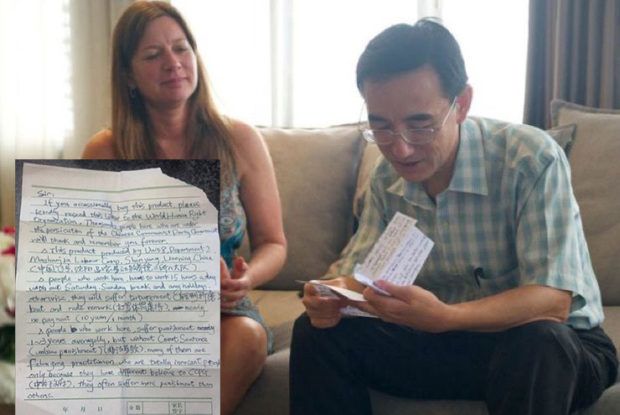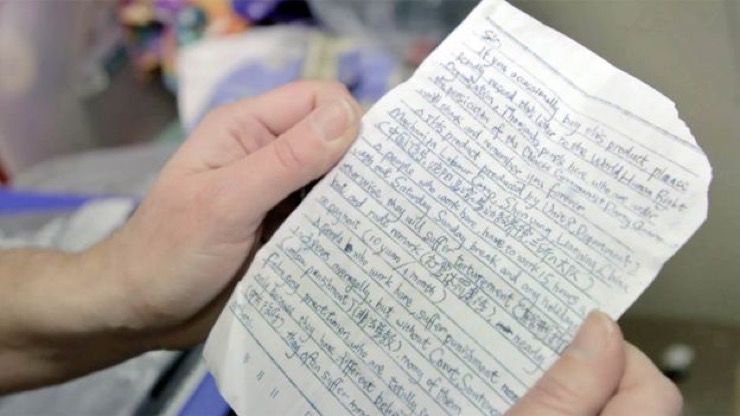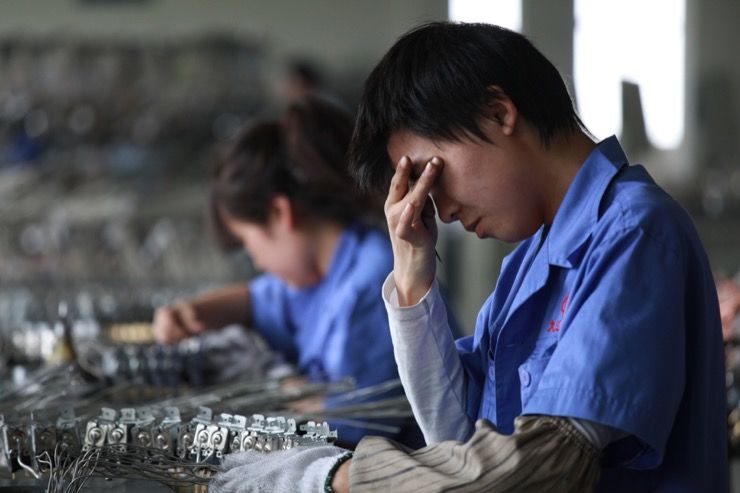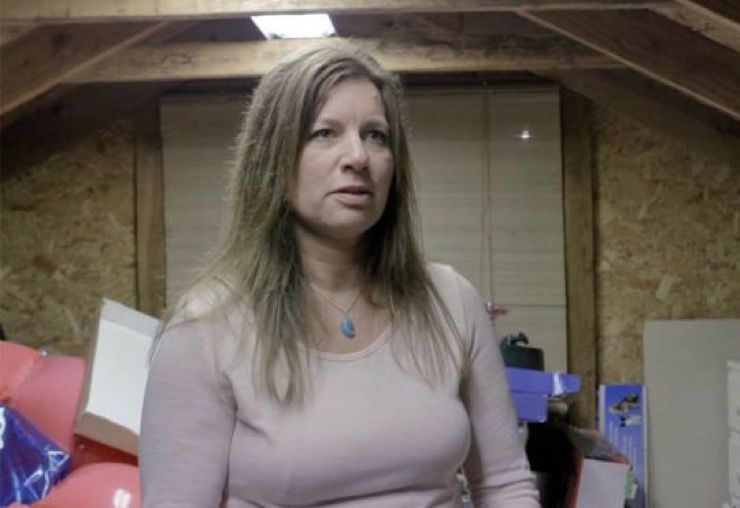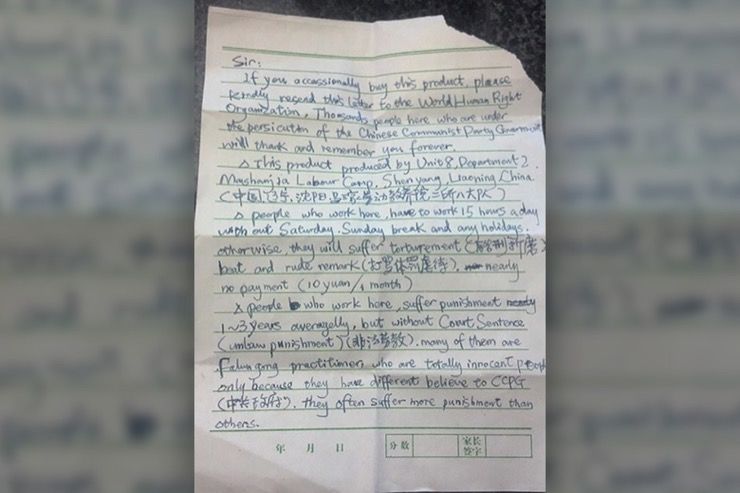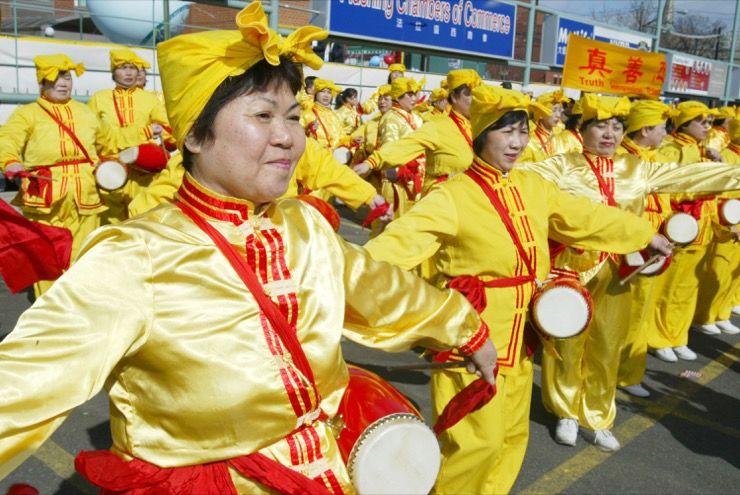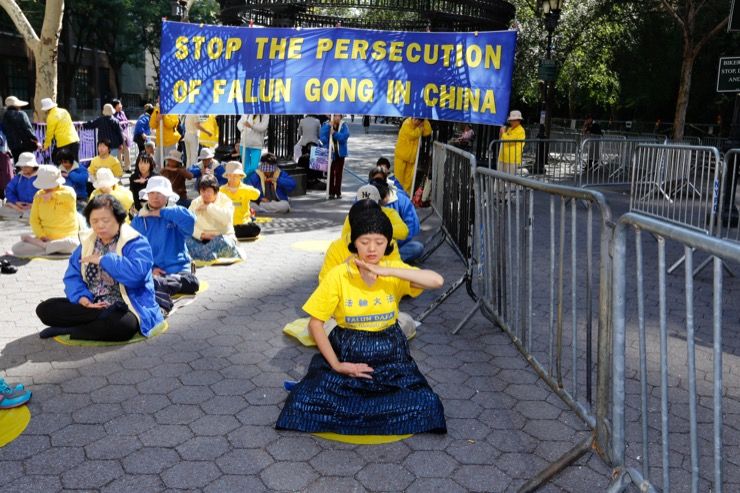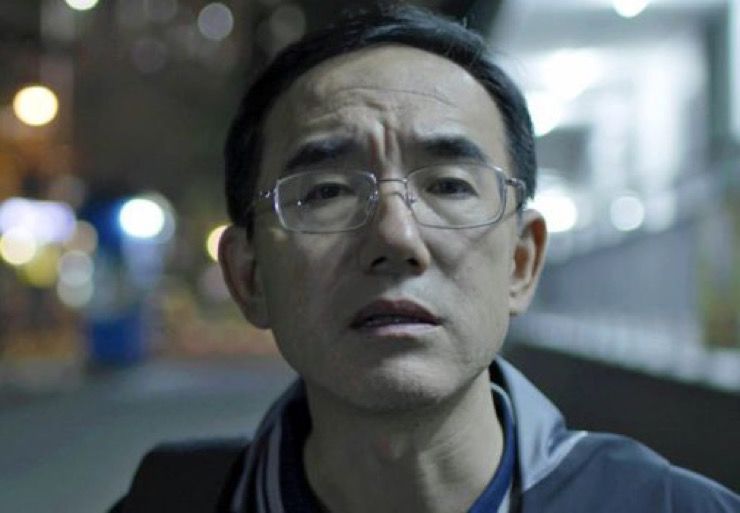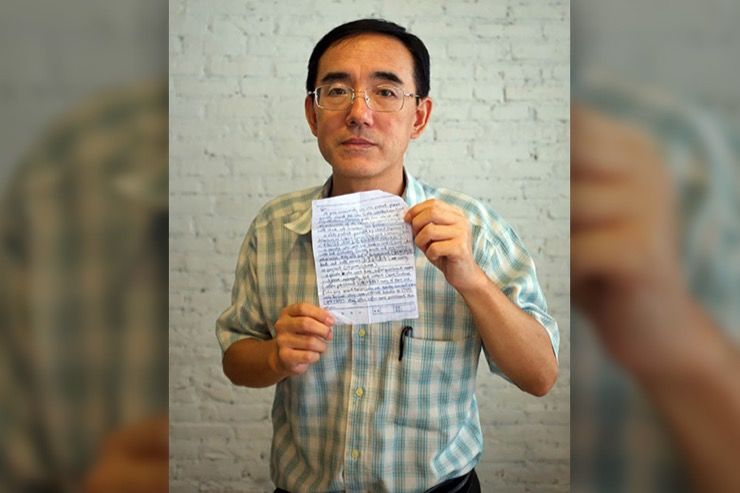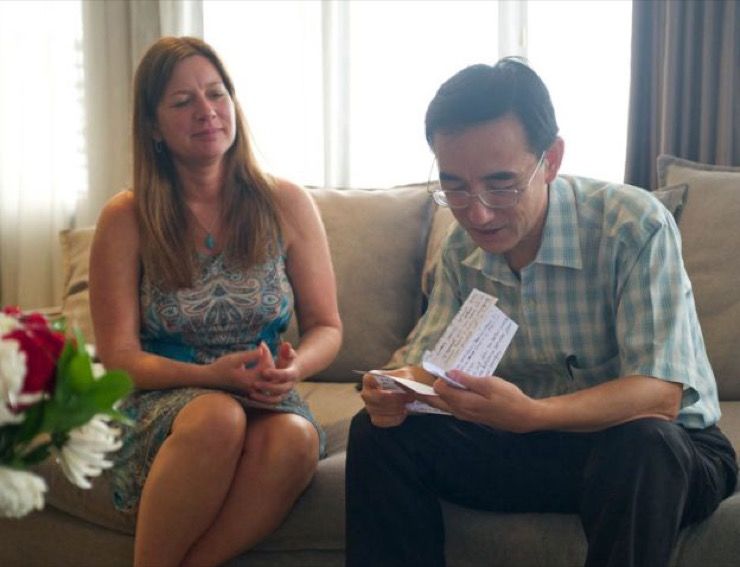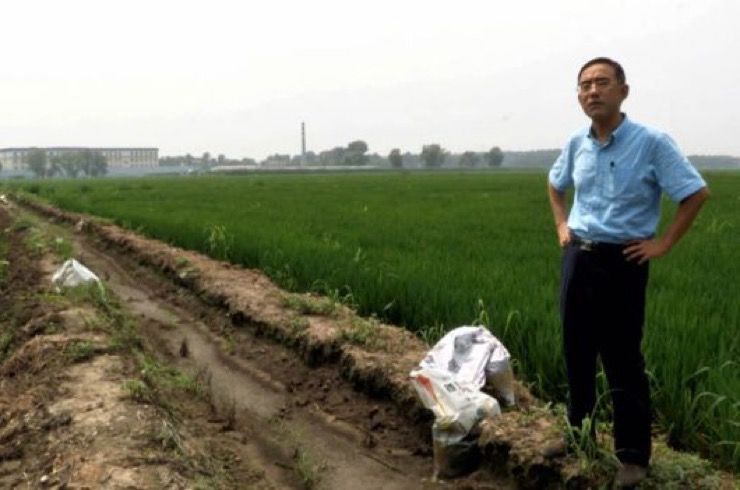We’ve all seen those funny fortune cookies. Maybe you’ve even got one that reads, “Help I’m being held prisoner in a Chinese bakery.” As hilarious as that particular situation sounds, it’s also patently impossible. That is, it would have seemed impossible a few years ago.
Julie Keith’s five-year-old daughter wanted a Halloween-themed birthday party. So Julie went up to the attic and fished out the $30 polystyrene tombstones, fake bones, and skulls she’d bought and never used and got it all together. As she opened the box, a sheet of ruled paper fell to the floor. There was writing scrawled upon it.
Broken English
The message upon the paper was hand-written in blue ink. It was broken English, misspelled at times but neatly written. It said: “Sir, If you occasionally buy this product, please kindly send this letter to the World Human Right Organization. Thousands people here who are under the persecution of the Chinese Communist Party Government will thank and remember you forever.”
The Letter
Reading on, Julie saw that the graveyard kit she’d bought at Kmart had been made in unit eight, department two of the Masanjia labor camp in Shenyang, China. The writer explained that the Inmates in the camp, placed there without trial for up to three years, work 15-hour shifts, seven days a week for barely $1.44 a month. If they refuse to work, they are beaten and verbally abused. It was terrible.
Terrible Conditions
The shocking note had no signature at the end and it left Julie reeling. This was no joke fortune cookie, this was an atrocity happening in the real world, not even that far from Portland, Oregon where she and her family lived. What’s worse was the fact that the Halloween kit was already two years old. How desperate was the author now, years later? Was he even still alive?
Where to Begin
Julie was just a normal person, she wasn’t worldly, she was a manager at the Goodwill thrift store chain. Still, she knew that if this person was so desperate to write a note to the outside world asking for help, she had to do everything she could to help them. She just didn’t know how. So she asked her Facebook friends for advice.
Posted Note
She took a photo of the note and posted it on social media. Her friends suggested that she contact human rights organizations and get them involved. She did so but received no reply. Her PR manager then took the note to a local newspaper and set up an interview. Months of silence followed until Christmas 2012 when the story finally ran on the Oregonian’s front page.
Widespread Word
Julie’s phone began ringing off the hook. Before long, TV networks and news outlets all over the world wanted to speak to her. She was in the midst of an international story and had helped create awareness of the atrocities in Masanjia. Unfortunately, in doing so she had also identified the whistleblower. The Chinese authorities knew who he was.
Negative Reaction
Many people criticized Julie’s publicizing of the letter. She may have been trying to raise awareness, but the would-be hero had made the fatal error of referencing the exact unit and department of the labor camp in which the note’s author had been held. Even knowing that this was what the writer wanted, she felt crushed by what she had done.
Nagging Sensation
Self-doubt nagged at her, until 2013 when The New York Times contacted her with some good news; they had tracked down the writer of the note. Not only that, but the formerly imprisoned man was out and had a message for her. Soon, Julie would not only learn his whole story but arrange to meet with him in person.
Falun Gong
Five years before that, Sun Yi found himself staring out the window of the mess hall at Masanjia prison camp when he saw something strange outside. Before he’d been arrested for practicing Falun Gong, a spiritual movement loosely based on Taoism and Buddhism, Sun Yi had been an engineer for an oil and gas company. He was married and had a good life but China’s communist government soon began to see Falun Gong as a growing threat.
Speaking Out
Falun Gong was growing in popularity and the communists didn’t like it. They persecuted followers of the religion and when some 10,000 practitioners rose to take part in a silent protest outside the ruling Communist Party’s Beijing headquarters, that proved the last straw. They were branded an “evil cult,” forced to practice in secret. Soon, Sun Yi found himself arrested in a raid at an underground press.
At The Camp
Sun Yi had been sentenced to two-and-a-half years in prison. That night, as he ate his meager dinner, he noticed workers carrying what looked like human skulls and thigh bones through the gathering gloom. He’d heard rumors of fellow inmates being tortured to death and wondered if this was proof. Sun Yi was then appointed to the Eighth Team, working on the “ghost job.” It was the last thing he wanted.
Morbid Decorations
The Chinese prisoner soon learned that the bones and tombstones of the Eighth Team were little more than morbid decorations for some Western holiday called Halloween. He had no idea what it was or why they wanted to decorate their homes in faux remains but was relieved that the dead bodies he’d seen were nothing but baffling oddments. Unfortunately, his time in Eighth Team would be anything but easy.
Long Hours
Within a few weeks, Sun Yi was exhausted and was dreaming of polishing tombstones. Black dye stained his hands and hunger pangs surged within him. He worked from four in the afternoon until after midnight. The only breaks he was given were to eat, though it was never enough to satiate him. The camp was a place for dissidents, criminals, and political prisoners but none of them deserved such terrible abuse.
Reputation
While he was in prison, Sun Yi learned that his wife wanted a divorce. She and her relatives had apparently been harassed because of his political affiliation. They would also fail background checks and be unable to get a job as long as she was married to him. He consented to the divorce and languished in the work camp. Finally, he decided he had enough.
One Chance
The thought occurred to him as he lay in a cell surrounded by 30 or 40 other inmates. The graveyard kits he was making were in English, a language he knew a bit of. If he wrote notes and included them in the boxes, maybe someone in the West might be able to strike a blow against the atrocities being visited upon he and his fellow prisoners. This first letter was just one of many.
Many Letters
During his time of incarceration, he had written and successfully hidden about 20 letters in the kits. He had to be careful, because the kits were randomly expected at times, but it seemed all the letters had been sent off without the info coming back to him. That is until a fellow inmate saw what he was doing and wanted to help. More letters meant more risk, but Sun Yi agreed.
Helping Others
Sun Yi soon started sharing letters with other Falun Gong devotees inside the camp. Eventually, one was discovered by guards. They tortured the prisoner but knew he must have an accomplice because the man didn’t speak English. Yet even under torture, the man didn’t give Sun Yi up. A crackdown occurred and Sun Yi was forced to stop the letters and hope someone found one of the others.
Release
In 2010, about the same time, Julie was buying the tombstones, Sun Yi was released from Masanjia. He continued to practice his Falun Gong but kept a low profile. In 2012, he was browsing the Internet and found something interesting; an article about a mysterious note found in Oregon. He contacted The New York Times, who helped facilitate the meeting. He wanted to thank Julie.
Across The Sea
Sun Yi had written a letter to Julie and was happy that her efforts publicized the atrocities he and his fellow inmates had suffered through. She was thrilled to know he was alive and know that she had been right to do as she’d done. Before long, she was flying out to meet him in his small apartment in Jakarta, Indonesia.
Meeting Him
It felt to Julie as though they had an instant connection. He called her his sister and bought her flowers. She brought the note with her and the tombstone. Then, Julie proceeded to explain all about the strange custom of Halloween, including what RIP meant. She left feeling happy about everything, but this was not the end of their story.
An Ignominious End
Life in Jakarta wasn’t easy for Sun Yi. Regardless of how low of a profile he kept, he couldn’t escape his past. He was soon contacted by a suspected Chinese agent. No one knows what they discussed but two months later, he died of acute kidney failure. He’d never had any kidney problems before then.
Honor
Besides his sisters and ex-wife, no one bothered to look into the cause of death. Julie was devastated of course. She had wanted a happy ending for the man who had suffered so much. Still, she admitted that she was honored to have met him and described him as one of the strongest, most resilient people she’d ever met.
